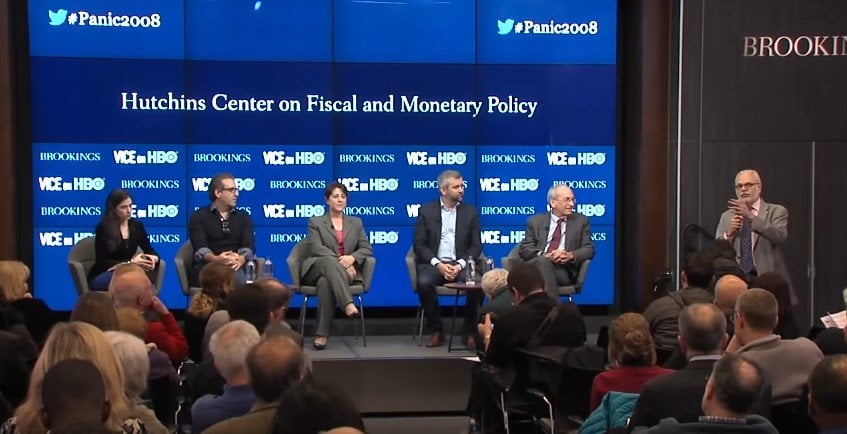On Tuesday, December 11, Brookings hosted a screening of “Vice Special Report: Panic: The Untold Story of the 2008 Financial Crisis.”
Washington, D.C. Premiere Of ‘Panic: The Untold Story Of The 2008 Financial Crisis’
Q3 hedge fund letters, conference, scoops etc
Transcript
Thank you everybody for your patience while we had those technical difficulties. I hope you agree with me that it was worth the wait. If there are people in Sol Zelko who would like to come in here we have a few chairs in here. I'm really pleased that we assembled a panel of people who have very different perspectives on the film starting here on the right. My colleague Don Cohn who was in the beginning stages of the crisis at the vice chairman of the Federal Reserve Board and lived some of those sleepless nights. He's responsible for everything that worked well and not responsible for anything that failed. Neil Irwin at the New York Times was one of a handful of journalists who've written just terrific books on the crisis. It is called the alchemists and it's about the international side of this thing which is extraordinary in a sense you don't get in the film that just how much this is affecting the rest of the world. Wendy Attleborough who is here because she was the executive director of the Financial Crisis Inquiry Commission which provided a lot of fodder for the film and for those of us who tried to figure out what the heck just happened. She's now at CBO. But she's really here and her her her past role as executive director of that commission. John Mazzeo who's the director of the film and can tell us like how did she get all those people to talk to you and how do you get that document and hand written thing where they write in. Twenty five billion dollars it looks like a check at Friendly's or something. And then our moderator is going to be Catherine Rampell who's an excellent columnist for The Washington Post. My hope is that we can hear a little bit about what people think about this narrative about the importance of narrative in general and what lessons do we draw from this. Well behind schedule but I think we're going to go. Catherine let the panel for about 25 minutes or so and then we'll have a few minutes at the end for questions from the audience not as many as we'd like. So with that Catherine I'll turn it over to you.
Thanks very much to our studio panelists and to all of you for sticking around including after the film as the main event film has ended. I wanted to start with a question for John actually. About what struck you as most surprising.
In your work on this film or what changed your perception the most of what happened 10 years ago in particular because the rest of us on the panel were living with it more intensively at the time either as journalists or as policymakers or otherwise. And you came to this with fresher eyes. So what was surprising to you.
Yeah I mean I came to this like I really you know I lived in as much as I bought my first home in 2004 and then I sold it in 2008 and I remember the I remember the experience of looking for a house and at first it was just real estate agents and then it was like mortgage brokers at the open houses and I bought one of those five arms and so it kind of hit live. The financial crisis in some way. But I'm not I'm not a financial reporter I'm not I know I don't make those kinds of films necessarily. So for me what I was struck by and what I want to do hopefully sort of achieve two things A that there were human beings behind all of these decisions. I mean I remember you know like like everybody's memory have a little snatches of moments of bipartisanship of seeing Hank hearing that Hank story building on his knees. You know they're all sort of familiar Chestnut's but it's all this stuff and this sort of you know the sleepless nights these guys went through and the sort of you know kind of really just coming out it feeling like yeah why did we build these guys. What the hell was going on and sort of really kind of sleepy myself in that in the story but really it was the humanity behind it that I'm as a filmmaker always most interested in. And it was really my warrant was to try to kind of. You know you all do such a great job explaining what the economics were. But I wanted to connect people emotionally. And so the fact that they those three guys really.






